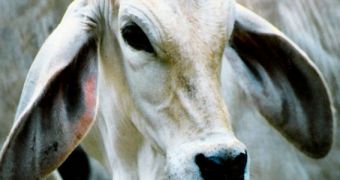A new research project funded by the European Union, called Ruminomics, is currently underway to determine whether or not cattle husbandry can be modified so that these animals release less methane into the atmosphere every year. Cattle are single-hoovedly responsible for releasing up to 1 percent of all greenhouses gases on our planet.
Their digestive systems produce methane in copious amounts. This gas is roughly 25 times more potent than carbon dioxide when it comes to supporting the greenhouse effect in the atmosphere. Cattle-produced methane accounts for around a fifth of all GHG emissions from agriculture, AlphaGalileo reports.
According to project scientist Phil Garnsworthy, who is a professor of dairy science at the University of Nottingham, in the UK, it is possible to reduce methane emissions from cattle by applying new diets, and by selectively breeding those species that naturally release less gases than their counterparts.
The main issue with this study is the relatively low understanding scientists have of how the herbivores' digestive systems work. Cows and other cattle have both a stomach and a rumen, and the interplays that develop between the two – which play a role in producing methane internally – are still only hinted at.

 14 DAY TRIAL //
14 DAY TRIAL //